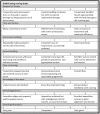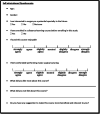Face-to-face versus distance learning of basic suturing skills in novice learners: a quantitative prospective randomized trial
- PMID: 35436934
- PMCID: PMC9014782
- DOI: 10.1186/s12909-022-03353-3
Face-to-face versus distance learning of basic suturing skills in novice learners: a quantitative prospective randomized trial
Abstract
Background and aim: Traditionally, practical skills are taught on face-to-face (F-F) basis. COVID-19 pandemic brought distance learning (DL) to the spotlight because of the social distancing mandates. We sought to determine the acceptability and effectiveness of DL of basic suturing in novice learners.
Methods: A prospective randomized controlled trial involving 118 students was conducted. Participants were randomized into two groups for learning simple interrupted suturing: F-F and DL-groups. Evaluation was conducted by two assessors using a performance checklist and a global rating tool. Agreement between the assessors was calculated, and performance scores of the participants were compared. Participants' satisfaction was assessed via a questionnaire.
Results: Fifty-nine students were randomized to the F-F group and 59 to the DL-group. Satisfactory agreement between the assessors was demonstrated. All participants were successful in placing three interrupted sutures, with no significant difference in the performance between the groups. 25(44.6%) of the respondents in the DL-group provided negative comments related to the difficulties of remotely learning visuospatial concepts, 16(28.5%) preferred the F-F approach.
Conclusion: DL of basic suturing is as effective as the F-F approach in novice learners. It is acceptable by the students despite the challenges related to the remote learning of practical skills.
Keywords: Distance learning; Face-to-face learning; Medical education; Pandemic; Suturing skills.
© 2022. The Author(s).
Conflict of interest statement
All authors have no financial or intellectual competing interests to disclose.
Figures







References
-
- Alam M, Nodzenski M, Yoo S, Poon E, Bolotin D. Objective structured assessment of technical skills in elliptical excision repair of senior dermatology residents: a multirater, blinded study of operating room video recordings. JAMA Dermatol. 2014;150(6):608–612. doi: 10.1001/jamadermatol.2013.6858. - DOI - PubMed
-
- Aparicio M, Bacao F, Oliveira T. An e-learning theoretical framework. J Educ Techno Soc. 2016;19(1):292–307.
Publication types
MeSH terms
LinkOut - more resources
Full Text Sources
Medical

